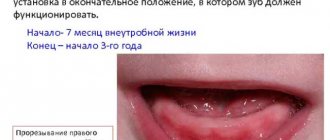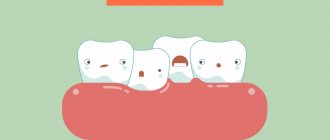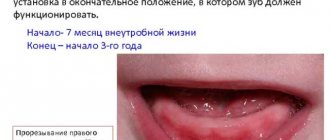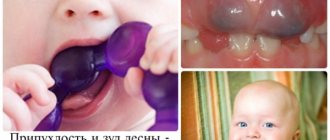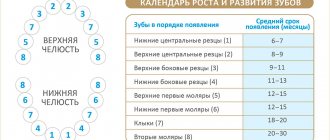Why a child has no teeth: the most common reasons
- Sometimes the reason lies in nutrition. Breastfed babies' teeth come out a little later than bottle-fed babies' teeth.
- Sometimes the delay is associated with a previous illness, intestinal dysfunction, improper metabolism or vitamin D deficiency.
- In some cases, late eruption is the result of pathologies during the mother's pregnancy. In this case, the sequence may be disrupted, and sometimes the rudiments of teeth are completely absent.
- If the tooth is initially located in the gum not vertically, but horizontally, which also occurs, it will erupt after 10-11 months.
- It is extremely rare that there are no teeth due to congenital adentia (genetic predisposition).
The child's baby teeth are not growing. This is fine?
Many parents worry about when their children will finally get baby teeth. What to do if the baby’s first tooth has not yet come out at six months? What if, at two years old, the child’s mouth still does not have a full set of teeth? Is the order in which teeth appear important or can everything happen individually?
Yulia Selyutina
Pediatric dentist
We decided to ask all these questions to the pediatric dentist and founder of the Dentistry Center Yulia Selyutina (@stomatolog_selyutina) to finally calm parental concerns.
From birth to three years of age, the child—and along with the parents—goes through several stages of development, as a result of which a full set of baby teeth appears in his initially toothless mouth.
There are diagrams and tables that show the timing of the eruption of baby teeth. It is these numbers that doctors and parents often rely on when waiting for the next tooth to appear.
On average, baby teeth begin to erupt at six months, and the last ones appear by two and a half years.
However, it should be remembered that all these terms are relative and highly averaged. Deviations can be either smaller or larger. Sometimes there is a direct dependence on the climate in which the child lives, nutrition, genetic and individual developmental characteristics.
Don’t worry if your baby doesn’t have a single tooth at one year old or if one or more teeth have already erupted at three months. By the way, teeth can come out one at a time or in pairs and even in groups. This is also normal. Even if the first baby tooth erupts closer to a year, there is no reason to worry.
So, if the pediatrician says that everything is in order with the child’s general health, then we put panic aside, allowing the baby’s teeth to appear at the right time for them. Teeth cutting out of order or at the wrong time is not a reason to prescribe medications or vitamins.
Moreover, a dentist has no right to do this. Calcium and vitamins are prescribed only by a pediatrician if there are compelling reasons for this.
Around 2.5–3 years of age, the child has all his milk teeth, that is, 20 teeth. If not all teeth have erupted by this time, then you can worry and urgently make an appointment for a professional examination with a pediatric dentist.
Read more on the topic
The longest baby tooth is included in the Guinness Book of Records
The child does not want to brush his teeth: here are 6 applications that will correct the situation
3 Serious Dental Problems That Children Have (and That Can Be Prevented!)
Who are we and where can you read us?
After all, we have not only a website!
How a dentist can help
If you are not ready to wait a year, seek help from a good pediatric dentist. The specialist will take an X-ray of the jaw to ensure the presence of tooth buds. If everything is fine, all you have to do is calmly wait for the process to begin - gum enlargement and increased salivation. Now it's time to help the baby:
- a ring stimulator will moderate itching, reduce discomfort and speed up teething;
- You can gently massage your child’s gums with a clean finger or a small spoon;
- stimulates tooth growth and fortified complementary foods - healthy juices and purees. While there are no teeth, solid complementary foods cannot be introduced.
Facts about teething
Teething is a complex physiological process that lasts for several years. During this period, the formation of tooth germs and their movement inside the jaw occurs. The process of teething is most often quite painful. There is a gradual change in the bite: a temporary (milk bite) changes to a permanent one. This is due to the development of bones in the child, in particular, with the growth of the skull bones. Also during this period, the formation of bone structures, soft tissues that surround the tooth, and the resorption of the roots of the milk units occurs to free up space for the permanent ones.
The first stage of tooth formation begins in the embryonic period. The complete completion of this process occurs with the eruption of wisdom teeth at approximately 25 years of age.
Parents' actions
How to properly take a complete blood test for a child
Parents should be wary only if their baby is completely missing teeth by the age of one. If there are simply few of them, then these are the individual characteristics of the child.
After a consultation with a pediatrician, tests can be performed and, if necessary, an x-ray of the baby’s jaw to determine the reasons for the delay in teething. If there are no abnormal processes or congenital pathologies, then you just need to wait.
In some cases, your doctor may recommend taking vitamin D. However, parents should not decide on their own how to take it.
Teething in most cases is accompanied by general and local symptoms, which can be more or less irritating for the baby. Overall, these are minor and temporary disruptions. The most common are:
- swollen and inflamed gums;
- excessive salivation;
- excitability;
- disturbed sleep;
- in some cases, lack of appetite, fever, diarrhea.
At 7 months of age, it is still too early to worry and you should not take any action to speed up teething. However, you can help your baby ease this process if his teeth are about to come out:
For your information. All activities must be done in compliance with the necessary hygiene.
- When a child puts everything that comes into his hands into his mouth, it is necessary to prepare a special children's toy or rubber rings. They massage the gums and stimulate teeth to come out. In addition to toys, you can give your baby pieces of fruit or vegetables, but they should be large enough to prevent part of the fruit from getting into the throat;
Baby with teething ring
- Cold eases the itching and pain of teething, so before giving it to your baby, you can put the toy or rings in the refrigerator (but not in the freezer!);
- You can massage your gums with your hands, placing sterile gauze soaked in cold water on them;
- Anti-inflammatory and analgesic teas (sage, chamomile) are very effective in combating gum pain. They are sold at the pharmacy. You need to give your child tea from a spoon; you can apply it to the gums with a cotton swab;
- If your baby is drooling a lot, it is best to wear a bib during the day. The skin around the mouth must be kept dry, otherwise redness and irritation will appear.
Parents must be patient and remember that each child is different. For him, there are only his own timing and order of teething, which may differ even from the timing of his siblings. Not all children cut their teeth according to average patterns, just as not all of them suffer when the first tooth comes out.
What Doctor Komarovsky says
Experienced doctor Komarovsky in his lessons gives answers to the problems that will arise for parents if the baby’s teeth do not appear. You can find many videos with his lessons on the Internet.
The main reasons for missing teeth on time are a lack of calcium and vitamin D. Much depends on the individual characteristics of the child and his body. Without examining the baby, it is impossible to say with certainty why he has a pathology.
In case of such a problem, it is important to visit a pediatrician, who will examine, find out the cause of the disorders, and refer you for consultations with doctors, if necessary.
Types of delay in teething
A discrepancy from the average statistical time of more than six months in the eruption of baby teeth is considered a delay.
The delay from the average time in the appearance of permanent teeth should not exceed a year. There are two types of late eruption.
- Late formation of dental follicle. In such a situation, the relationship between the development of the tooth and its appearance in the oral cavity is observed, but both processes proceed more slowly than expected.
- Late eruption. With this development, the tooth is fully formed, its root grows, but the dental unit cannot erupt. Fully formed teeth remain in the bone – impacted. They may be completely under the gum or partially visible from under it.
Before worrying about delayed eruption, it is necessary to diagnose the presence of a tooth germ in the bone. To do this, a panoramic photograph is taken, which makes it possible to distinguish the complete absence of a rudiment from a delay in formation.
When do the first teeth appear?
At the time of birth, the baby's teeth are in a state of formation inside the jaw bones. The bone contains a complete set of primary teeth at different stages of growth. The front incisors are the earliest to form and begin to emerge through the gums at six months of age. With the correct development of the child, dental units continue to erupt in pairs, i.e. one on each side. A full set of twenty primary teeth should appear in the first three years of a child's life.
What are the common teething symptoms and what do you recommend?
- Profuse salivation.
One of the most obvious signs is when drool is literally flowing in a stream. Moreover, the symptom may appear a couple of months before the start of eruption.
Saliva should be carefully wiped away as it appears damp towel or napkin so as not to damage the skin. It is best to use wipes that contain xylitol - it prevents the growth of bacteria and the appearance of rashes on the skin.
- A strong desire to put everything in the mouth and chew.
Chewing helps your baby relieve the itching. The main thing is to hide objects that he could accidentally swallow or injure himself.
Lifehack. Bend your index finger and gently insert it into your baby's mouth. If he starts squeezing it with his gums, it means teeth are definitely coming out. If it just sucks, then it’s something else.
- Skin rashes.
A small rash on the cheeks or chin may occur due to skin contact with saliva. On irritated skin you just need to apply baby moisturizer.
ATTENTION! If the rash around the mouth appears without other symptoms of teething, it is better to show the child to the pediatrician!
- The baby cannot suckle normally.
At the peak of feeding, he abandons her and begins to act up. And sometimes he can bite with his gums. In such a situation, there is no need to force the child to eat. Even if he misses 2-3 feedings, nothing bad will happen. When he gets really hungry, he will still take the breast or bottle and eat. If you have no appetite for more than 24 hours, call a doctor.
- Redness and swelling of the gums.
It begins 2-5 days before teeth appear, goes away on its own, you don’t need to do anything.
You can also notice a blue bubble on the gum. This is a eruption hematoma. It occurs as a result of the destruction of small vessels in the gums during tooth eruption. It does not require any specific treatment. It will soon resolve on its own.
Prevention of pathologies of eruption of baby teeth in children
It is impossible to control or influence such processes.
Dental buds are formed even before the baby is born, so after his birth it is difficult to change anything. During pregnancy, a woman should monitor her health, in case of illness, immediately consult a doctor, not self-medicate and not advance the disease. It is important to take vitamins, as they have a beneficial effect on the condition of the expectant mother and child.
After birth, parents are obliged to monitor the baby’s condition - take care of his health, provide complete and proper nutrition. This will affect not only the condition of the teeth, but also the overall development of the child.
Prevention of edentia
The best prevention is competent, timely oral care. Regular brushing of teeth and gums, preventive examinations at the dentist twice a year, giving up bad habits, switching to a balanced diet - all this will help keep your teeth healthy and strong for as long as possible.
If you or your child is experiencing this disease, do not delay visiting the dentist. Experienced therapists, orthopedists and implantologists at STOMA clinics will help solve the problem of partial or complete absence of teeth: they will select a comfortable and aesthetic prosthesis that will significantly improve the quality of life, make you more confident and beautiful.
Call and make an appointment by phone: +7 (812) 416-94-37. Our clinics are located in different areas of St. Petersburg and are open from Monday to Saturday, from 9 to 21 hours.
What to do if teeth do not erupt “on time”?
Nothing to do. As stated earlier, the timing is quite relative and not strict data. There is such a thing as the individual characteristics of a child. Plus neonatal indicators, physical constitution, etc. Thus, the timing of the appearance of teeth in your child is normal for him. The same applies to permanent teeth.
The later the teeth appear, the healthier they will be?
Is not a fact. The timing of teething does not affect their “quality”.
What sedatives can be used during teething? Do they influence the process itself?
No, such drugs do not affect the process of teeth formation and, as a rule, have no side effects. For children with allergies, there is a sedative called Doctor Baby that does not contain lidocaine. Almost all gels contain lidocaine and inert fillers (cooling menthol, astringents and flavoring additives). You can use Dentinox, Kalgel (be careful with diathesis, because it is sweet), Kamistad (very effective, but you need to know when to stop), Mundizal, Cholisal, Solcoseryl dental paste (especially good in the presence of wounds or ulcers).
How often should such drugs be used?
Soothing gels are not antibiotics and do not need to be used according to a specific regimen. If the child is in pain, apply it, but if everything is calm, don’t. But it’s better not to use it more than 3-4 times a day and for longer than 3 days in a row.
What determines the timing?
The timing of the formation of both temporary and permanent dental units in children can be compared with certain phenomena.
- Floor. In girls, all teeth, except the first upper chewing one, erupt earlier than in boys.
- Jaws. Teeth appear faster on the lower jaw than on the upper jaw.
- Position of teeth. Molars and premolars most often erupt with a delay.
- Bite. In primary dentition, delay occurs much less frequently than in permanent dentition.
- Population. Scientists have found that people living in different countries have different timing for the appearance of teeth. For example, among Europeans, delayed eruption is a fairly common occurrence.
- Climatic conditions. In warm climates, teeth erupt faster than in cold climates.
- Level of urbanization. City residents develop teeth faster than those in rural areas.
- Evolution. Recent generations are more likely to encounter anomalies in the eruption of wisdom teeth and canines in the upper jaw. Scientists explain this phenomenon with the evolution of humans as a species, and with the lack of space due to a decrease in the overall size of the jaw.
When should you see a doctor?
Teething causes a lot of discomfort for the baby. This does not require medical attention. But there are situations when you cannot do without the help of a doctor. You should contact him in the following cases:
- Painful cough.
- The temperature does not subside for a long time.
- There is mucus and blood in the stool.
- Diarrhea
- and purulent nasal discharge.
- Constipation.
- Mouth ulcers.
- Unnatural color of the shoots.
Symptoms from teething hide the manifestation of diseases, for example, ARVI or infectious diseases. It is important to consult a doctor if negative symptoms occur. Exercise caution in such cases rather than regret later what you didn’t do.
Schedule glitches: reasons
When a baby has no teeth at 8 months, this cannot be attributed to pathology. The period of appearance of teeth in a child is associated with the characteristics of the body. It happens that a baby may be born with teeth.
Circumstances for which there are no teeth at 8 months:
- Genetic factor.
- Lack of calcium and vitamin D.
- Metabolic disorders in the mother and inflammation in the body during pregnancy.
- Drinking alcohol, smoking during pregnancy.




